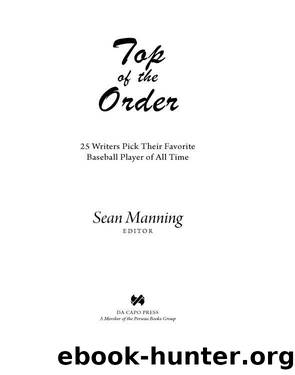Top of the Order by Sean Manning

Author:Sean Manning
Language: eng
Format: epub
Publisher: Hachette Books
Published: 2010-03-16T00:00:00+00:00
Jackie Robinson
ROGER KAHN
The volume sits on my mantle, worn by almost fifty years of reading and revisiting, always with affection. Echoing the famous, desperate cry of Brooklyn Dodger fans, the book is called Wait Till Next Year. The author has graced the title page with an inscription, dated December 6, 1961.
To Roger with respect and admiration. It has been good knowing you and working with you over the years.
The words are signedâwith a large capital JâJackie Robinson.
I pick up the battered old volume, bound in black and a little frayed, and emotions surge.
Pride, of course, that Jack and I were friends.
Enthusiasm. How wonderful it was to watch him play baseball.
Anger. Bigots forever were assaulting him with hate.
Sorrow. White-haired before his time, he died at the age of fifty-three.
Then, finally, an almost spiritual happiness. America at last is realizing that there, on the now paved-over soil of Ebbets Field, stood a hero, strong and indomitable in combat, caring and compassionate after the games were done.
On April 15, 2009, which the lords of baseball proclaimed Jackie Robinson Day, every major-league player was directed to wear Robinsonâs number, 42. This was a perfect instance of glorious excess. Robinson was first and foremost an individualist, playing with a style wholly his own. Dabbing his number on hundreds of jerseys from San Diego to Boston runs counter to that reality. But it is mean-spirited to decry efforts within baseball to celebrate the man and his legacy.
It wasnât always that way, even in Brooklyn. Jack had a dynamic, sometimes confrontational manner, as opposed to the diffident style of such other early black major leaguers as the great Dodger catcher Roy Campanella. Walter OâMalley, The Big Oom, who ran the Brooklyn club, preferred his hired hands to be servile.
Robinson played in Brooklyn for ten years, batting an aggregate .311, stealing 197 bases. I canât precisely say how many pitchers he rattled with his adventurous base running, but a sound guess is every pitcher in the league. Going clear back to 1900, before Robinson reached Flatbush, the Dodgers had won only four pennants. With him aboard, the Brooklyn team won six. Jack could run and hit and steal and intimidate, and he emerged as the remarkable leader of the remarkable team that I called, in my 1972 book, The Boys of Summer. (Patent applied for; royalties cheerfully accepted.)
Numbers cannot capture passion, and passion was at the core of the way Robinson playedâand, in point of fact, lived. If I had to pick a single day that displayed his various gifts (and I believe I do), that would be September 30, 1951, the last afternoon of the regular season, when the Dodgers and the Philadelphia Phils played what could very well be the most exciting ball game in the annals.
This was a strong Philadelphia team, which had won the pennant the year before. That autumn the Dodgers were scrambling, having lost a thirteen-and-a-half-game lead to the New York Giants and, as the Philadelphia game progressed, actually falling a half game behind the Giants, who defeated the Boston Braves.
Download
This site does not store any files on its server. We only index and link to content provided by other sites. Please contact the content providers to delete copyright contents if any and email us, we'll remove relevant links or contents immediately.
Machine Learning at Scale with H2O by Gregory Keys | David Whiting(4289)
Never by Ken Follett(3930)
Liar's Poker by Michael Lewis(3436)
The Ultimate Backcountry Survival Manual by Aram Von Benedikt; Editors of Outdoor Life;(3255)
Will by Will Smith(2901)
The Partner by John Grisham(2393)
Can't Hurt Me: Master Your Mind and Defy the Odds - Clean Edition by David Goggins(2319)
Friends, Lovers, and the Big Terrible Thing by Matthew Perry(2211)
Taste by Kris Bryant(1857)
HBR's 10 Must Reads 2022 by Harvard Business Review(1832)
A Short History of War by Jeremy Black(1831)
A Game of Thrones (The Illustrated Edition) by George R. R. Martin(1707)
Never Finished: Unshackle Your Mind and Win the War Within by David Goggins(1694)
515945210 by Unknown(1660)
The Arm by Jeff Passan(1604)
Why We Love Baseball by Joe Posnanski(1592)
443319537 by Unknown(1541)
The Dodgers by Schiavone Michael;(1527)
The Yogi Book by Yogi Berra(1520)
